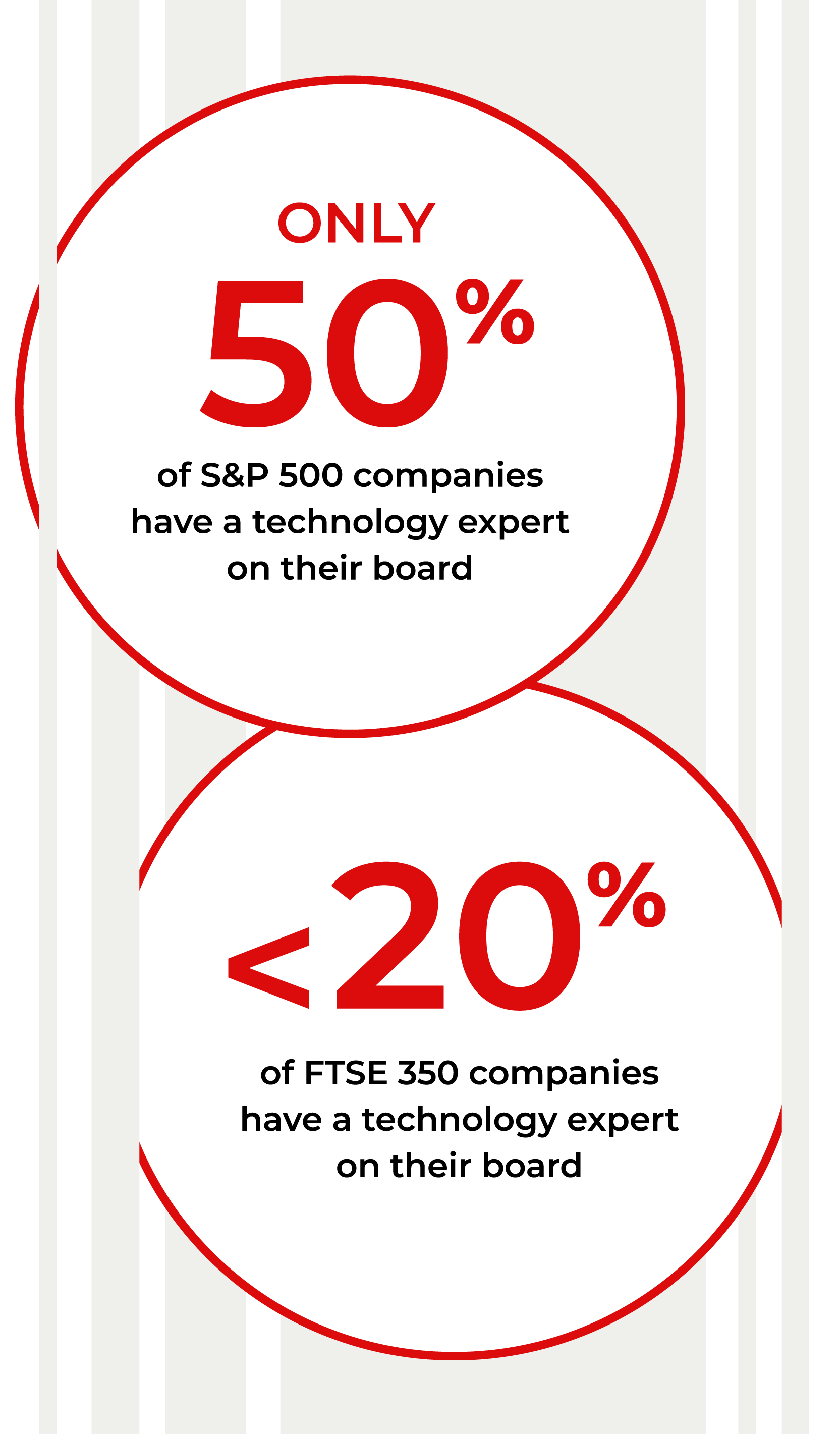WITH INSIGHTS FROM

Caroline Lo
Managing Director, Head of the CEO, Board and Financial Services Practices
.

Calum MacDonald
Principal, Financial Services Practice
The constant challenges today’s companies face range from crisis management to rapid technological shifts like AI. This demands a significant change in the highest levels of corporate leadership: Boards of Directors must grapple with technology’s implications across operations, risk, and governance, and integrate it deeply into strategy.
We believe every board needs a technology expert. We’ve seen increased client demand—from both public and private companies—for technology experts on boards, especially in financial services. This isn’t about tech spending, but about tech and business collaboration for competitive advantage. To gain deeper insights across asset classes, we consulted Chairs, Nomination Committee Members, Board Members, and executives in the US and EMEA, spanning public and private organisations.

In this report, talent experts from True’s Board Practice outline seven reasons to add a technology expert to a board, with advice for candidates on choosing a board, smooth onboarding, and identifying companies genuinely seeking change.
Addressing the boardroom gap
Data from Bain & Company confirms tech-savvy directors are linked to outperformance in leading banks, a trend we expect to see spreading across sectors. Our research indicates that only 50% of the S&P 500 and less than 20% of FTSE 350 companies have a technology expert on their board. We also see a growing disparity between tech-native and traditional businesses. Many of the latter, in particular, “don’t know what they don’t know” regarding the possibilities and risks of AI, data usage, modern architecture, and emerging threats and opportunities like Quantum computing.
This knowledge gap often leads to missed chances and increased risk exposure, leaving traditional businesses vulnerable in a rapidly evolving market. One contributor emphasised that most companies require a board member to provide broad technology education: “You need someone to help you understand it, not just to make good tech decisions, but to help you understand what’s at stake.” Whilst the range of technological issues discussed at the board level is too extensive for one individual to address comprehensively, adding at least one technology expert will significantly enhance the collective understanding of all board members.

Why every board needs a tech expert
- TO PROTECT & SECURE THE BUSINESS
Recent headlines involving high profile retailers illustrate the critical need for businesses to safeguard themselves and their customers against increasingly sophisticated cyberattacks. Quantum computing, for instance, presents a significant threat to current cybersecurity measures, as it can break widely used encryption algorithms in just a few hours. “This stuff is not SciFi—it’s here,” one source said. “We need to treat risks as they are now, not as we have previously.” Whilst boards of businesses with a strong online retail presence often possess excellent digital, channel, and online commercial expertise to drive growth, they often lack a technology expert informed on protection. In tech-native companies, the CEO might fill this role, but in traditional businesses, a non-executive board member is typically needed.
- TO DRIVE GROWTH
Technology has moved beyond being merely a defensive tool or a means to achieve efficiency. “It unlocks countless opportunities and acts as a horizontal enabler that touches everything,” observed one board member. It is now a fundamental driver of growth, transforming industries and underpinning every opportunity for advancement. Even in seemingly unrelated non-tech businesses, systems like ERP serve as the operational backbone. The strength and capabilities of a company’s technological platform are crucial for fostering expansion and innovation. A board, therefore, has the responsibility to understand technology’s role in supporting strategy, particularly when evaluating return on investment. - FOR BROADER BOARD TECH DIALOGUE
Whilst board education modules traditionally focus on finance, governance, risk, compliance, and communication, they rarely address technology. Some initiatives are beginning to bridge this gap.
Including at least one technology expert on a board significantly enhances the collective technological understanding of all members, but more tech expertise is needed for broader tech dialogue. These experts also provide a bridge to the wider tech community, connecting management to the best specialists in a particular field of technology. “Complex businesses have multiple sets of tech issues that can’t be solved by one person,” one contributor said. “It’s too multifaceted.”
This benefit is reciprocal: the tech expert also gains insights from their colleagues on broader board matters beyond just tech. Ultimately, it’s important that once they join, every board member acts in the general interest of the organisation, and their role is not limited to their specialisation. Just as an executive team shares collective ownership of strategy and results, a board must operate with a unified sense of responsibility. - TO SUPPORT & CHALLENGE THE CTO
Our research reveals many boards currently lack the broad tech expertise needed to effectively engage with technology at a strategic level. Just as the Chair-CEO relationship is crucial, and Audit and Remuneration Chairs partner closely with the CFO and CHRO, forward-thinking boards are increasingly seeking to “mirror the executive committee.” When a business scales its engineering organisation, a non-executive director (NED) with a technology and product background is invaluable in supporting the Chief Technology Officer and Chief Product Officer.
Effective governance demands a deep understanding to ask the right questions and provide meaningful oversight. Whilst boards may be comfortable with initial questions about technology, a tech expert can go deeper, asking the important second or third questions and discerning the quality of the answers received. They can get straight to the heart of complex technological issues, ensuring the board’s discussions are truly impactful. - TO DRIVE TRANSFORMATION
Implementing new operating systems or critical technologies can be transformative for many businesses. M&A, for instance, often necessitates a complete overhaul of existing systems post-acquisition, and growth strategies frequently rely on inorganic opportunities. With executives already managing demanding day-to-day operations, a board-level sponsor with prior experience in overcoming such technological hurdles can provide invaluable support.
These NEDs can help prioritise efforts to capitalise on opportunities, avert potential disasters, and lead technological due diligence for target companies. They offer crucial insights from past experiences with system overhauls, data architecture, integrations, migrations, and implementing change in habits and adoption. “The first time we replaced our back office systems, it was a disaster,” one board member shared. “If we’d had a [tech] expert on the board, we would have taken a different route.” - TO FUTURE-PROOF
Boards must proactively evolve their composition, anticipating future challenges rather than reacting to past ones. Integrating technological expertise is key to this evolution. Given that a typical board term can be close to a decade in some regions, the strategic challenges a company faces can change significantly during a director’s term. Board succession planning should actively consider the skills required to navigate the next 5-10 years, aligning with the future direction of the business. This goes beyond just adding one tech expert—it involves rebalancing the board’s entire skills matrix to reflect the central role technology plays in today’s business landscape. - TO SET THE TONE: CULTURE STARTS AT THE TOP
During our conversations, several board directors emphasised the critical role of culture: “The culture of both a board and a company is the most important piece. Adoption of technology is never a straight line, and it’s never going to be perfect. Technology transforms, shifts, and reshapes work, and culture brings the willingness to embrace it.”
An informed, open-minded, and forward-thinking board significantly enhances engagement with the executive team. For technology leaders considering board roles, it’s essential to seek a Chair who cultivates collective intelligence, exhibits presence and humility, asks probing questions, and encourages in-depth discussions rather than focusing solely on superficial governance. Ultimately, leading businesses foster a culture that embraces technology across all functions, not just within the tech department.

Beyond technological expertise
Directors with technology backgrounds bring more than just tech knowledge; they offer the specific mindsets and skills critical for navigating the modern business landscape. They act as translators and storytellers, articulating complex technological risks—such as cybersecurity vulnerabilities or AI ethics—and opportunities, in terms of concrete business impact and financial implications.

They help a board focus and prioritise, cut through hype, and put the right guardrails in place to focus on the right topics and avoid distracting or unproductive conversations. They also provide a critical bridge between strategy and operations, understanding both the technological possibilities and the practical and commercial realities (often more effectively than pure consultants or less commercially-minded directors).
Insights from integrating tech experts into boards
Just 10 to 20 years ago, a number of prominent companies appointed former CTOs or CIOs as non-executive directors to their boards. However, it did not always go well. These individuals sometimes found it difficult to contribute to the broader board agenda and were often misunderstood by their fellow board members, leading to short tenures. Therefore, technology—and tech experts—were less integrated into the overall business.
Today’s CTOs and CIOs, particularly those who have recently held these positions, are generally well versed at understanding how technology impacts and informs the overarching business agenda. They have been integral members of the executive team, collaboratively leveraging technology to execute strategy.
Many Chairs will need to coach and induct technology experts to help them learn quickly, onboard safely, and contribute broadly. This approach sets the right tone and culture, embracing technology and providing the right platform for these specialists.
Board members are responsible for enhancing the skills of their tech-expert colleagues in areas needing improvement. Effective methods to achieve this include comprehensive inductions and providing exposure to other sub-committees. These approaches help underscore fiduciary responsibilities and the wide range of topics where their contributions are valuable.

What tech experts should consider when joining a board
Whilst technological expertise may be the primary factor in selecting these candidates, an effective board member must offer contributions to topics beyond their specialism. A tech expert, once on the board, must not remain a tech specialist. Such an individual must have the curiosity to invest time in understanding the entire business. They must also be self-aware of their own learning needs and acknowledge the “unknown-unknowns” they will encounter.
Selecting a board led by an exceptional Chair is crucial for first-time NEDs. “When I look for NED roles, I never choose a company, I choose a Chair,” one client said. The Chair’s influence on culture is especially critical for tech experts. Candidates should also carefully assess the board’s willingness to embrace change, invest in new initiatives, and operate with agility, ensuring these aspects align with their own professional thinking and operating style.
First-time NEDs with a tech background must adjust to not being the primary technology authority when mentoring the executive team—that’s the CTO’s role. Shifting from direct involvement to a role of challenging and supporting through insightful questioning often takes time. Candidates should seek feedback and advice on their readiness for this role, and identify areas where they will need to learn and adapt.
Looking ahead
Technology’s widespread influence means the future is already upon us, though it may be evolving, unevenly distributed, or misunderstood. Boards are responsible for staying ahead to effectively support and challenge their executive teams.
Whilst not yet standard, technology committees are becoming more common, and we anticipate their increased emergence. Given the rapid pace of change driven by modern technologies like AI, we expect to see more sitting CTOs and CIOs serving as Non-Executive Directors on other company boards. This will foster knowledge sharing and enable successful businesses to accelerate innovation even further.

With special thanks to:
Steve Baldwin
Akshaya Bhargava
Catherine Bradley
Sarah Butterfass
MB Christie
Claudia Frese
Wei Gao
Julius Genachowski
Chris Jacquet
Caoimhe Keegan
Matt Noyes
Piero Overmars
Frank Stockx
Jen Taylor
Ron Teerlink
Erik Tiden
Steve Van Wyk
Jan Verplancke
Philippe Vimard
Ben Wishart
For media inquiries, contact Jillian Ruggieri